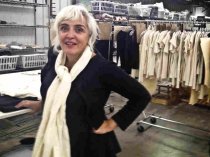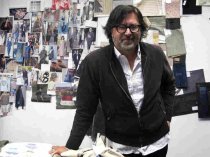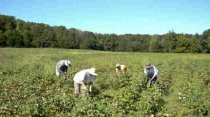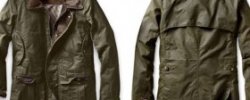 Workers tend the organic cotton fiber plants in an experimental field in north Alabama. The cotton was utilized in a field-to-garment task by two noted manner developers. Due to Lisa Lentz conceal caption
Workers tend the organic cotton fiber plants in an experimental field in north Alabama. The cotton was utilized in a field-to-garment task by two noted manner developers. Due to Lisa Lentz conceal caption
Workers often tend the organic cotton fiber flowers in an experimental area in northern Alabama. The cotton fiber was utilized in a field-to-garment task by two noted style manufacturers.
Courtesy of Lisa LentzYou might have heard of "farm to dining table, " but what about "field to apparel"? In Alabama, recommended style homes Alabama Chanin and Billy Reid have a fresh type of natural cotton garments created from their cotton fiber industry.
It isn't simply a research in keeping production local; it really is an effort to bring back the lengthy custom of apparel-making when you look at the Deep Southern. North Alabama had been when a hub for textile production, with readily available cotton fiber and usage of cheap labor. However the industry all but disappeared after NAFTA became legislation, as functions moved overseas.
Today, Sue Hanback is again working a sewing machine in a cavernous building that was when an element of the biggest cut-and-sew operation in Florence, Ala.
"I'm going to five-thread this top, " she explains, sewing cuffs onto an organic-cotton sweatshirt.
Hanback ended up being final laid off in 2006 when this was a T-shirt factory. The woman spouse worked in dye household. She is already been a seamstress all the woman life.
"from the time I became 18 years of age, " Hanback states. "to ensure that had been like, 48 many years."
 Keeping Cotton Local
Keeping Cotton Local
Hanback is regarded as about 30 those who work on The Factory, residence to Alabama Chanin, the fashion and lifestyle company founded by Natalie Chanin. The website includes a cafe, workshop together with business's flagship shop.
Chanin is better recognized for the woman flowing, made-to-order natural clothes, completely hand-stitched and empowered because of the outlying South associated with the 1930s and '40s.
Clothier Natalie Chanin stands in front of in-progress garments in the Alabama Chanin Factory. Chanin and Billy Reid, internationally acclaimed manufacturers, have teamed around test the thought of natural, renewable cotton agriculture and garment-making. Debbie Elliott/NPR hide caption
toggle caption Debbie Elliott/NPRClothier Natalie Chanin appears facing in-progress garments on Alabama Chanin Factory. Chanin and Billy Reid, globally recommended developers, have actually teamed to test the thought of organic, lasting cotton fiber agriculture and garment-making.
Debbie Elliott/NPRShe actually is recently included a fundamental machine-made line, utilizing experienced regional seamstresses like Hanback.
"it is not only 'factory work, ' " Chanin says. "this will be a skill that's dying call at this nation."
It's part of the country's "social durability to preserve these things, " Chanin says, "to make our clothes."
 American manufacturing is in Chanin's DNA: Her grandmother and great-grandmother regularly just work at a plant right here that made underwear when it comes to military. Life in North Alabama as soon as revolved round the attire business, but couple of flowers continue to be. Now, Alabama is better-known for automobile production compared to the clothes it creates.
American manufacturing is in Chanin's DNA: Her grandmother and great-grandmother regularly just work at a plant right here that made underwear when it comes to military. Life in North Alabama as soon as revolved round the attire business, but couple of flowers continue to be. Now, Alabama is better-known for automobile production compared to the clothes it creates.
But Florence, a little city tucked in far northwest place associated with the state, is getting a unique reputation for style. Both Chanin and her buddy Billy Reid, additionally a designer, tend to be headquartered right here.
Both have obtained coveted honors from the Council of Fashion Designers of The united states, among others.
"We broke down, type of, those barriers in a few methods, [showing] that you can do it from everywhere when you do it appropriate and do so real, " states Reid.
He is known for classic American designs a ny instances reviewer when called "whiskey-soaked style."
His company lover, K.P. McNeill, may be the one who initially seriously considered growing their cotton.
Garments designer Billy Reid in his design studio in Florence, Ala. Debbie Elliott/NPR conceal caption
toggle caption Debbie Elliott/NPRClothing designer Billy Reid in his design studio in Florence, Ala.
Debbie Elliott/NPR"I think the first idea truly came from simply operating through these places in the fall whenever cotton fiber has been chosen and baled, " McNeill says.
It got him thinking about whether all of that cotton had been sent overseas when organizations here could be using it.
Therefore McNeill took a concern to Chanin: "Can we go from seed to finished product in identical community?" he asked.
'Straight From Field To Form'
Chanin ended up being fascinated. It made her think of just how years ago, manufacturing had been a lot more of a vertical affair.
"They were developing the cotton; these were ginning the cotton fiber; these were processing it, " she states. "therefore ended up being going right from field to create, I call-it."











